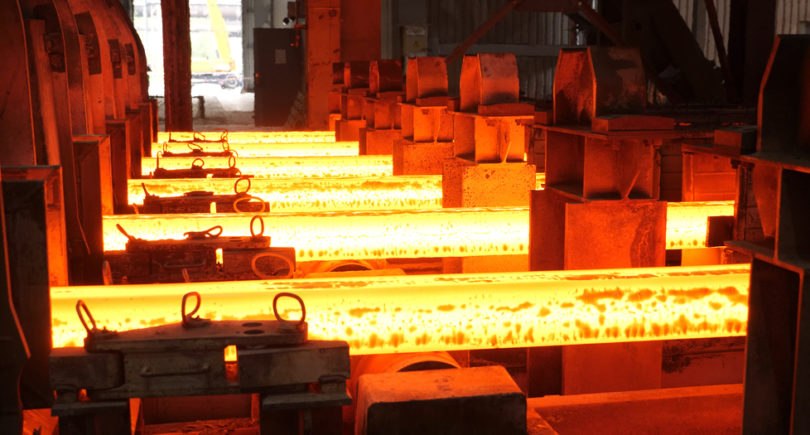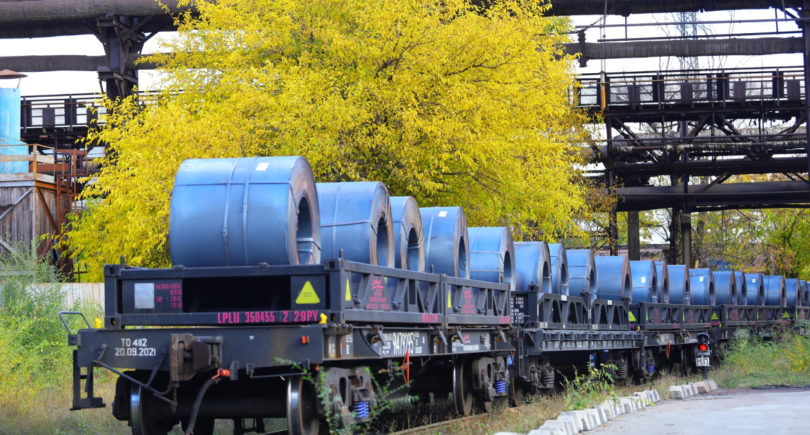
Prices for flat products in the global market showed a greater drop than prices for long products
Trends in global prices for flat products coincides in many respects with trends in global prices for long products. Analysis of trends in prices for hot-rolled coil (FOB Black Sea) shows that it partly coincides with trends in rebar prices. The key economic factors were the same in both cases: changes in raw material prices (a rise in the iron ore price following the Vale accident, and a slump in scrap prices), weaker demand due to trade wars, and increased competition due to growing protectionism.
At the same time, prices for hot-rolled coil declined even more sharply (-25% in November YoY) than prices for rebar (-20%). Long products prices mainly depended on the performance in the construction sector, whereas prices for flat products were influenced by a much larger number of sectoral factors.
No help from China
While the construction sector in the key steel consumption regions demonstrated growth and somewhat supported the steel market, industrial performance started to sharply decline since the very beginning of the year. In many respects, the trends in global industrial production was determined by the fall in car sales.
Car sales are an important indicator of the state of the economy. In 2019, almost all regions around the globe faced a decline in car sales and, consequently, in production, which negatively affected consumption of flat products. Global car sales decreased by 8% in H1 2019. Among the reasons for the fall in demand are a slowdown in the global economic growth, trade wars, the uncertainty around Brexit, and a rise in prices for automobiles due to more stringent environmental requirements.
China’s production performance started going down since December 2018 — PMI dropped below 50 to 49.4. Throughout the year, no improvement was recorded even despite active economic promotion. Incentives supported mostly the construction sector.
As of H1, the largest drop in the auto sales was recorded in China (-14.4%), following 30 years of steady growth. Trade wars sparked a slowdown in China’s economy, which accounts for 25% of the global automotive production. Automotive production in China decreased by 12.7%. As a result, China began to increase exports of flat products for the first time in four years, while its imports went down.
A similar situation is playing out in India, suffering from problems in the financial system and a liquidity crisis.
Uneasy Europe
The start of the fall in car sales in the EU dates back to November 2018 when the Worldwide Harmonised Light Vehicle Test (WLTP) was introduced (a new procedure to measure the fuel consumption and pollutant emissions).
“Car sales in the EU fell by 3.9% over 6 months. The situation in export markets was weak as well, and therefore production fell by 7.2%. The automobile industry is important for the EU industrial production, as production chains and 20% of demand for steel are linked to it. In Q3, car sales in the EU grew by 2.3 YoY, but this was due to low comparative benchmarks,” explains Andrii Tarasenko, GMK Center Chief Analyst.
In late September–October, PMI of the Euro Area countries reached its minimum since 2011, 45.7. The EU had to once again strengthen protective measures and impose a 30% individual quota for HRC shipments. This primarily hit Turkey. Besides, initiating an anti-dumping investigation into Turkey’s hot-rolled products, of which the exports grew in the recent years, is up for debate. It has to be noted that Turkey was not involved in the investigation against Ukraine, Russia, Brazil, and Iran in 2017 and thus got certain advantages. Naturally, increased protectionism means increased competition, which in turn affects market conditions.
Other factors
Sales of passenger cars in the U.S. decreased by 3.3%, and production by 6.5% over the first 6 months of 2019. A growth in sales of commercial vehicles so far contributes to the overall vehicle production trend in the U.S. and consumption of flat products. This is despite the fact that the U.S. prices declined more sharply than the global average prices due to high comparative benchmarks in 2018.
In general, MPI in mechanical engineering is also decreasing around the globe. The World Steel Association expects a 0.2% drop. Trade wars, anticipated recession, and growing protectionism triggered a decrease in business investment in fixed assets.
“MPI in mechanical engineering in the EU decreased even more — minus 0.8% in Q2 YoY, as EU’s mechanical engineering companies are export-oriented (the U.S., China, Turkey),” explains Andrii Tarasenko.
Russia is the only exception to this rule, since its domestic market is expected to grow by 4–5% at the year-end. In the first seven months of the current year, consumption grew by 10%, while consumption of flat products in particular grew by 6%. Considering high capacity utilization in Russia, companies prioritized the domestic market and reduced exports. This means that the Russian market somewhat alleviated the challenging situation in global markets.
Expectations 2020
In autumn, prices for flat products collapsed due to a 20% drop in scrap prices in Turkey over 6 weeks in August–September. A jump in prices is observed since late October. Scrap prices grew from $225 to $270 per ton, thus altering the price trend. How long will it last?
The situation in China remains a key factor affecting the flat products market. According to the International Organization of Motor Vehicle Manufacturers (OICA), some 25.8 million new vehicles will be sold in the Chinese market in 2019, 8% down from the previous year.
Meanwhile, the World Steel Association says that incentives of the Chinese government will contribute to domestic car sales. Measures to reduce taxes are also expected to be taken in 2020. China Association of Automobile Manufacturers (CAAM) expects a negative trend to continue, but with less intensity.
The demand from the EU countries is unlikely to maintain prices for flat products. EUROFER expects car production in the EU to decrease by 3.8% in 2019, with a just 0.9% increase in 2020. This will not maintain prices, since this is an extremely low growth rate from 2019 low comparative benchmarks. In its turn, the performance of manufacturing index in the EU mechanical engineering may rise by modest 0.2% next year. In other words, it is more correct to speak of stabilization at the current level, not growth.
Much of the European market of hot-rolled products will depend on the future of Italian Ilva, as ArcelorMittal, the world leader, pins high hopes on its development. At the same time, the steel giant is ready to give up the purchase of the plant if no compromise with the Italian government is found. The cancellation of the deal will mean Ilva’s shutdown.
A possible imposition of a 25% duty on imports of EU cars to the U.S. is a serious risk factor. This may have disastrous consequences for the automotive industry not only in the EU, but also in the U.S., since EU companies have plants in the U.S. and vice versa. Production chains may be disrupted as well.
World Steel Dynamics believes that the current prices are unlikely to have hit the bottom line, as commodity prices are expected to decline. The trade deal between the U.S. and China, if signed of course, will give the market a temporary breathing room in crisis, as many companies deter investment for this very reason. At the same time, SteelHome estimates a possible fall in hot-rolled coil prices at 6.7% next year.
Download the full version of GMK Center’s report on trends in global prices for flat products here.





